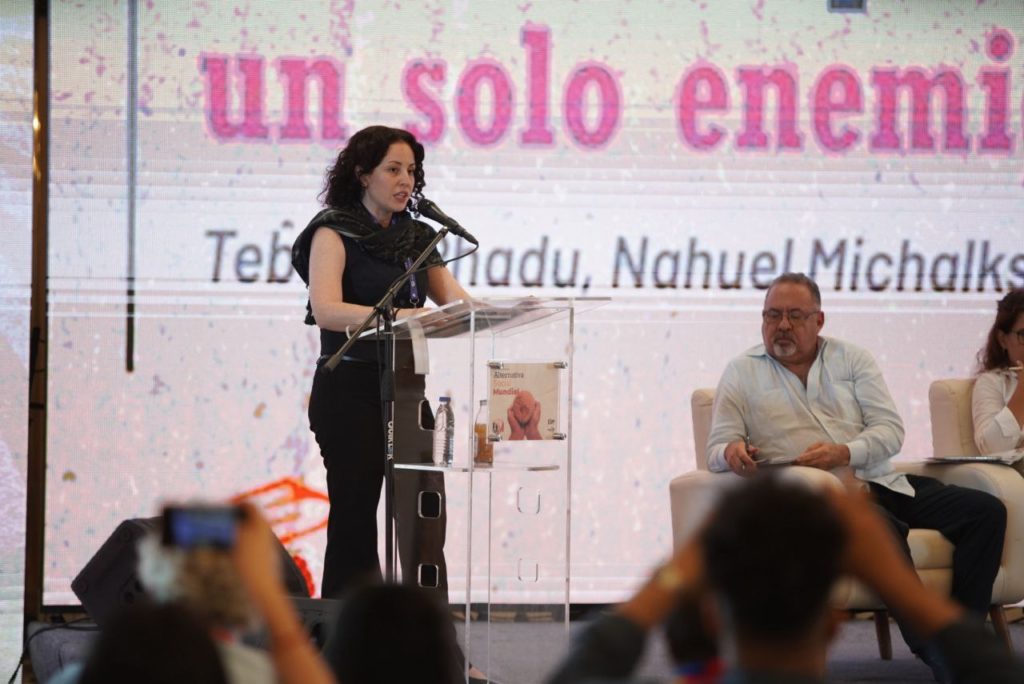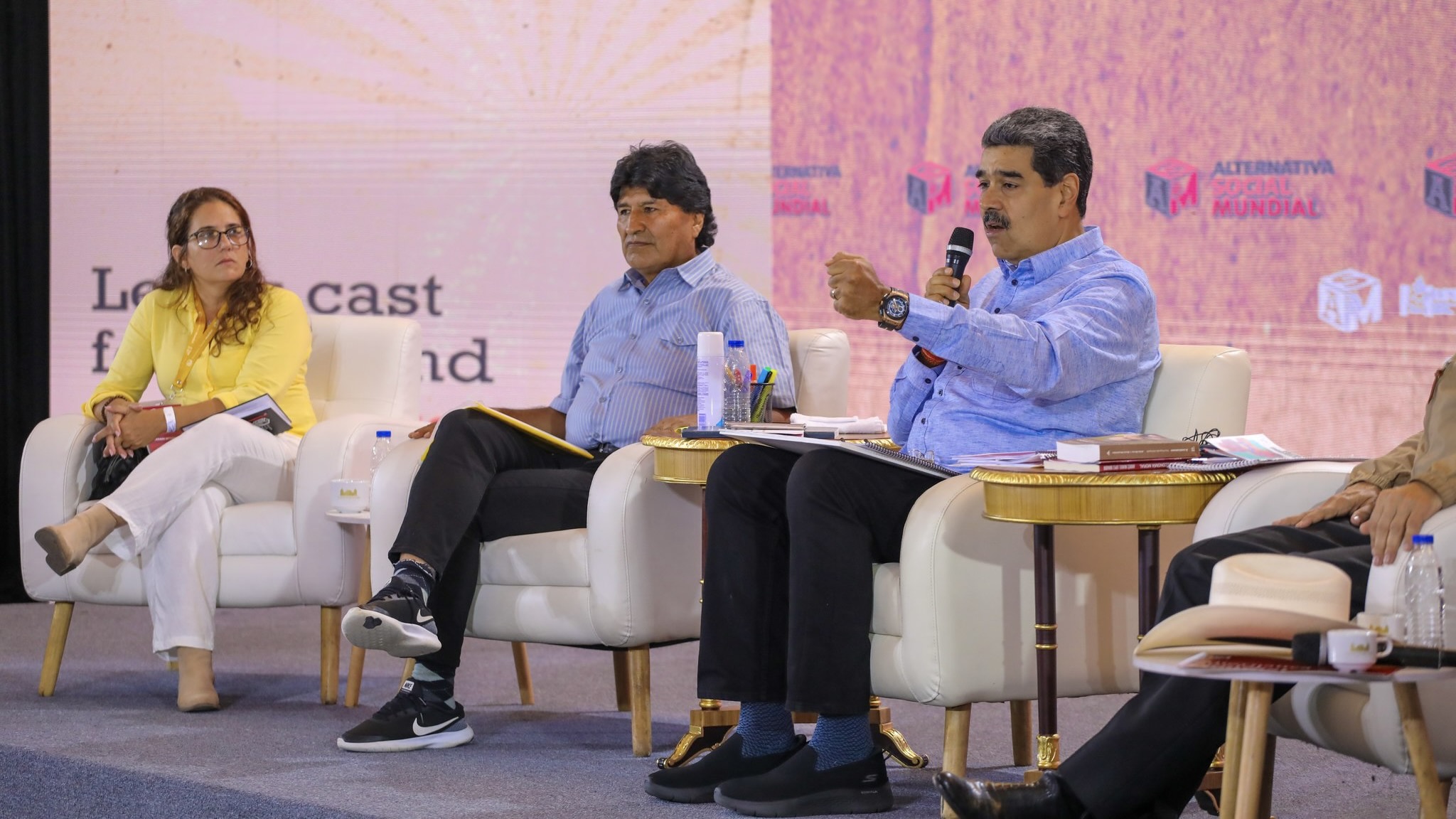500 representatives from movements, unions, and parties hailing from countries across the world gathered in Caracas, Venezuela for the World Gathering for a Social Alternative. The meeting organized by the Simón Bolívar Institute for Peace and Solidarity and ALBA-TCP kicked off on April 18 and will conclude on April 20.
During the first two days of debate and discussion, panelists and participants discussed the pressing tasks of the left and progressive movements to organize the masses and confront the climate crisis, the rise of the right, imperialist attacks, and fortify internationalist solidarity. Speakers also emphasized the relationship between progressive governments and political projects and mass movements, and the need for greater levels of coordination and support.
The organizers of the event have stated that they hope to consolidate points of unity that can become collective solutions to the real problems of the people and to build a new model of civilization.
The meeting held in the Bolivarian Republic comes just three months ahead of the presidential elections in the country, which have already been categorized by the US government as “undemocratic” and have been used as a pretext to intensify the unilateral coercive measures against Venezuela. Speakers throughout the first two days of discussion emphasized the need to stand in solidarity with the Venezuelan people who for the last ten years have been resisting under a tough US-sanctions regime, and despite overwhelming challenges have continued to deepen their revolution.
All speakers in the gathering also declared their complete rejection of the Israeli genocide of the Palestinian people and categorized zionism as a brutal tool of US imperialism. The bravery and strength of the Palestinian people who continue to resist after over 75 years of the zionist settler colonial project was praised as an inspiration to all oppressed people across the world.
The people of the world must organize to defeat imperialism and fascism
The first day began with a presentation from the executive secretary of ALBA-TCP, Jorge Arreaza who spoke about the importance of the gathering and the current moment facing the people in Latin America and the Caribbean and the world.
Following that there were panel discussions on “Dangers and threats to humanity”, “Civilization in decline”, “Only one imperialism, only one enemy”, and “The necessity of a common project”. Speakers included Venezuelan Vice President Delcy Rodríguez, Argentine sociologist and political scientist Atilio Borón, former Cuban Minister of Culture and President of the Casa de las Américas Abel Prieto, US-Lebanese journalist Rania Khalek of BreakThrough News, Mexican journalist Alina Duarte, Colombian activist from the Black Communities Process Carlos Rosero, director of The People’s Forum Manolo De Los Santos, and Stephanie Weatherbee, the coordinator of the International Peoples’ Assembly (IPA).
In her presentation, the Venezuelan VP Rodríguez emphasized that “Inequality is a true threat to humanity, that is derived from the capitalist model, and it is our hemisphere, Latin America and the Caribbean, that has some of the most unequal territories. That is why the response has to come from us.”
The VP also harshly criticized the rules-based order of the West and its hypocrisy. With regards to the climate crisis she stated, “The world is living the consequences of the north that did not respect the norms of nature and also used it to the detriment of humanity to generate more wealth.” She added, “the Global South will be very affected by the climate emergency, even though we were not the primary [nations] that caused it.”
The Venezuelan leader also criticized the US-led campaign against Venezuela on the day that the US did not renew the licenses on its oil sector, effectively reactivating the sanctions. “They want to rule Venezuela through licenses. The [Venezuelan] people give very clear results in response to a criminal blockade. We are not going to kneel. Here the laws of Venezuela prevail.”
Journalist Rania Khalek focused her intervention on the genocide in Gaza and what it has taught the people of the world about the nature of imperialism and the people’s struggle to defeat it. “Everyone in this room recognizes that US imperialism is the biggest threat to humanity,” she declared. “Gaza is how far they’re willing to go. None of us are safe in this US-led order…This moment of hyper imperialism of imperialism on steroids, seeks to destroy and punish anyone who refuses to submit to the current order and the imperialists are willing to carry out genocide as punishment.”
“They want to stop us from building a better and liberated world,” she added.
Argentine sociologist Atilio Borón highlighted that although the imperialist attacks continue to intensify, especially with the escalation in his own country under Javier Milei, it is imperative to continue building an alternative, multipolar world order which has begun to emerge in recent years. He sentenced, “The predominance of the west over the rest of the world has ended.”
The popular educator and coordinator of the IPA, Stephanie Weatherbee, declared, “With ‘the end of history’ they wanted to deny us the possibility of dreaming beyond the brutal inequality and the alienating and atomized society that neoliberalism – does not offer – imposes on us.
This narrative, Weatherbee emphasizes, denies the possibility and existence of the alternatives that already exist to capitalism and neoliberalism. She asked, “What is Cuba, what is Vietnam, what is China, what is Venezuela?” Social democracy is tolerated, she added, because it limits and contains the people’s organization, but “people’s organizations always have to move forward. Those who see organizations as a danger are afraid of the revolution. And this weakening of our organization opens gaps where fascism grows.”

Revolutionary governments, revolutionary movements
The gathering was co-organized by ALBA-TCP (Bolivarian Alliance for the Peoples of Our America – Peoples’ Trade Treaty), which is a platform of states in Latin America and the Caribbean formed in 2004 by Cuba and Venezuela to promote political and economic integration. The platform’s current executive secretary Jorge Arreaza, emphasized in his intervention on the second day of the gathering, that the platform must go beyond the 10 member countries but as a common project. “We have to assume ALBA as the spirit of our peoples, we have to speak to our children about ALBA…, our continent,” Arreaza stated.
Arreaza highlighted that as the Community of Latin American and Caribbean States (CELAC) continues to outweigh the Organization of American States (OAS) as the primary instrument of Latin American integration, ALBA-TCP and the movements have a fundamental role to play to ensure that it maintains a progressive and integrationist perspective.
This dialogue between progressive governments and movements in the region who are organizing the masses and mobilizing on the streets, is a fundamental part of advancing the agenda of integration.
“Unity is the only possible path and we have to work on agreements in unity…For this the Council of Social Movements [of ALBA-TCP] is essential, you are the only ones who can make a counterproposal to United States imperialism,” Arreaza stated.
“Let’s make ALBA our common banner, we must unite together against the primary enemy (imperialism and capitalism). Capitalism dehumanizes us and isolates us.”
The second day of the gathering concluded with a discussion led by Venezuelan President Nicolás Maduro with participation from former Bolivian President Evo Morales, former Honduran President Mel Zelaya, national leader of the MST João Pedro Stedile, and Cuban popular educator and parliamentarian Llanisca Lugo.
The Venezuelan president affirmed, “As revolutionary movements that are in power, we should maintain the permanent mobilization of the masses. It is one of the keys of the Bolivarian Revolution. Activated people, mobilized people in any circumstance, it is the only way to be prepared for the battles that we have to wage.”





